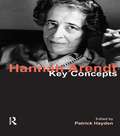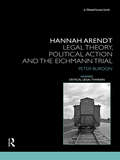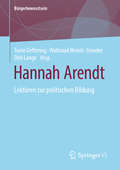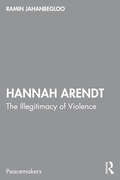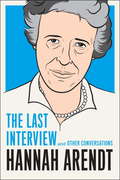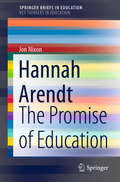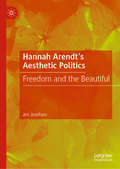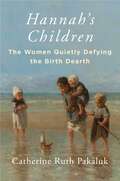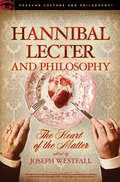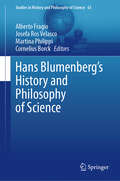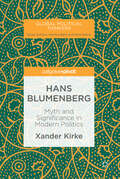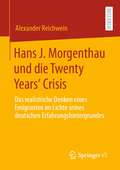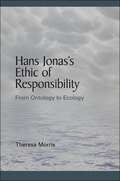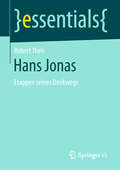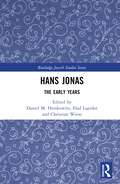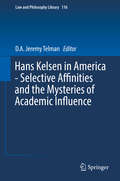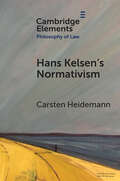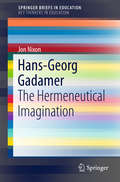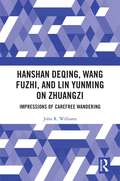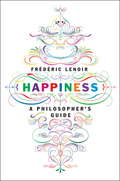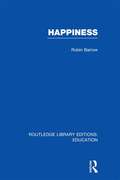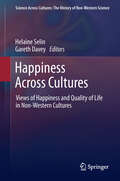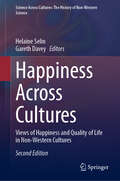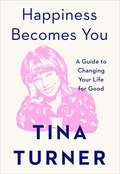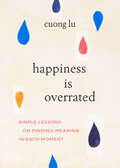- Table View
- List View
Hannah Arendt: Key Concepts (Key Concepts)
by Patrick HaydenHannah Arendt is one of the most prominent thinkers of modern times, whose profound influence extends across philosophy, politics, law, history, international relations, sociology, and literature. Presenting new and powerful ways to think about human freedom and responsibility, Arendt's work has provoked intense debate and controversy. 'Hannah Arendt: Key Concepts' explores the central ideas of Arendt's thought, such as freedom, action, power, judgement, evil, forgiveness and the social. Bringing together an international team of contributors, the essays provide lucid accounts of Arendt's fundamental themes and their ethical and political implications. The specific concepts Arendt deployed to make sense of the human condition, the phenomena of political violence, terror and totalitarianism, and the prospects of sustaining a shared public world are all examined. 'Hannah Arendt: Key Concepts' consolidates the disparate strands of Arendt's thought to provide an accessible and essential guide for anybody who wishes to gain a deeper understanding of this leading intellectual figure.
Hannah Arendt: Legal Theory and the Eichmann Trial (Nomikoi: Critical Legal Thinkers)
by Peter BurdonHannah Arendt is one of the great outsiders of twentieth-century political philosophy. After reporting on the trial of Nazi war criminal Adolf Eichmann, Arendt embarked on a series of reflections about how to make judgments and exercise responsibility without recourse to existing law, especially when existing law is judged as immoral. This book uses Hannah Arendt’s text Eichmann in Jerusalem to examine major themes in legal theory, including the nature of law, legal authority, the duty of citizens, the nexus between morality and law and political action.
Hannah Arendt: Lektüren zur politischen Bildung (Bürgerbewusstsein)
by Dirk Lange Tonio Oeftering Waltraud Meints-StenderHannah Arendts Philosophie des Politischen ist in der zweiten Hälfte des 20. Jahrhunderts zum Klassiker avanciert. Ihr emphatischer Begriff des Politischen wird in der Sozialphilosophie und in der politischen Theorie kontrovers debattiert. In jüngster Vergangenheit ist auch in der politischen Bildung eine deutliche Zunahme der Arendt Rezeption zu verzeichnen, in der auf ganz unterschiedliche Weise auf ihre Schriften Bezug genommen wird. Die Autorinnen und Autoren dieses Bandes nehmen dies zum Anlass, bildungspolitische Zugänge und Lektüren von Hannah Arendts Schriften zu präsentieren, um damit ihren grundlagentheoretischen Beitrag zur politischen Bildung zu erfassen.Mit Beiträgen von Fred Dewey, Jerome Kohn, Wolfgang Heuer, Ingo Juchler, Dirk Lange, Bettina Lösch, Helgard Mahrdt, Waltraud Meints-Stender, Ingeborg Nordmann, Tonio Oeftering und Elisabeth Young-Bruehl
Hannah Arendt: The Illegitimacy of Violence (Peacemakers)
by Ramin JahanbeglooThis book presents an original understanding of Arendt in the context of comparative political theory. The author discusses Arendt’s acute and perceptive view of violence as well as practical applications of her thought in a comparative context.The book examines Hannah Arendt’s ideas about politics and violence provoked by the horrors of totalitarianism. It applies the rich potential of Arendt’s insights to the wider cultural context and discourse of nonviolence. Through case studies of India and Iran, it presents a new way of reading Arendt’s understanding and critique of violence beyond the simple analysis of her work on power and violence.An original, nuanced and meaningful guide to Hannah Arendt, the book will be essential reading for students and scholars in politics, philosophy and peace and conflict studies.
Hannah Arendt: The Last Interview
by Hannah ArendtArendt was one of the most important thinkers of her time, famous for her idea of "the banality of evil" which continues to provoke debate. This collection provides new and startling insight into Arendt's thoughts about Watergate and the nature of American politics, about totalitarianism and history, and her own experiences as an émigré.Hannah Arendt: The Last Interview and Other Conversations is an extraordinary portrait of one of the twentieth century's boldest and most original thinkers. As well as Arendt's last interview with French journalist Roger Errera, the volume features an important interview from the early 60s with German journalist Gunter Gaus, in which the two discuss Arendt's childhood and herescape from Europe, and a conversation with acclaimed historian of the Nazi period, Joachim Fest, as well as other exchanges.These interviews show Arendt in vigorous intellectual form, taking up the issues of her day with energy and wit. She offers comments on the nature of American politics, on Watergate and the Pentagon Papers, on Israel; remembers her youth and her early experience of anti-Semitism, and then the swift rise of the Hitler; debates questions of state power and discusses her own processes of thinking and writing. Hers is an intelligence that never rests, that demands always of her interlocutors, and her readers, that they think critically. As she puts it in her last interview, just six months before her death at the age of 69, "there are no dangerous thoughts, for the simple reason that thinking itself is such a dangerous enterprise."
Hannah Arendt: The Promise of Education (SpringerBriefs in Education)
by Jon NixonThis book gathers some of Hannah Arendt’s core themes and focuses them on the question, ‘What is education for?’ For Arendt, as for Aristotle, education is the means whereby we achieve personal autonomy through the exercise of independent judgement, attain adulthood through the recognition of others as equal but different, gain a sense of citizenship through the assumption of our civic rights and responsibilities, and realize our full potential as sentient beings with the capacity for human ‘flourishing’ and ‘happiness’ (eudaimonia). In order to appreciate the pivotal role that education plays in Arendt’s analysis of the human condition, we have to understand the emphasis she placed on ‘thoughtfulness’, as the measure of our humanity and on ‘thoughtlessness’, as the measure of our inhumanity. Education sustains and develops the human capacity: to think together (phronesis), to think for oneself (what Arendt called ‘the two-in-one’ of thinking), and to think from the point of view of others (what she termed ‘representative thinking’). From the developing constellation of ideas embedded in her vast and varied body of work, the author infers a notion of education as a necessary preparation for personal fulfillment, social engagement, and civic participation.
Hannah Arendt’s Aesthetic Politics: Freedom and the Beautiful
by Jim JosefsonWe face a crisis of public reason. Our quest for a politics that is free, moral and rational has, somehow, made it hard for us to move, to change our positions, to visit places and perspectives that are not our own, and to embrace reality. This book addresses this crisis with a model of public reason based in a new aesthetic reading of Hannah Arendt’s political theory. It begins by telling the story of Arendt’s engagement with the Augenblicke of Nietzsche, Kierkegaard, Jaspers, Heidegger, Kafka and Benjamin, in order to identify her own aesthetic Moment. Josefson then explicates this Moment, what he calls the freedom of the beautiful, as a third face of freedom on par with Arendt’s familiar freedoms of action and the life of the mind. He shows how this freedom, rooted in Jaspers’s phenomenology and a non-metaphysical reading of Kant, serves to redress the world-alienation that was a uniting theme across Arendt’s works. Ultimately, this volume aims to challenge orthodox accounts of Arendtian politics, presenting Arendt’s aesthetic politics as a radically new model of republicanism and as an alternative to political liberal, deliberative and agonistic models of public reason.
Hannah's Children: The Women Quietly Defying the Birth Dearth
by Catherine PakalukA portrait of America's most interesting yet overlooked women.In the midst of a historic "birth dearth," why do some 5 percent of American women choose to defy the demographic norm by bearing five or more children? Hannah&’s Children is a compelling portrait of these overlooked but fascinating mothers who, like the biblical Hannah, see their children as their purpose, their contribution, and their greatest blessing. The social scientist Catherine Pakaluk, herself the mother of eight, traveled across the United States and interviewed fifty-five college-educated women who were raising five or more children. Through open-ended questions, she sought to understand who these women are, why and when they chose to have a large family, and what this choice means for them, their families, and the nation. Hannah&’s Children is more than interesting stories of extraordinary women. It presents information that is urgently relevant for the future of American prosperity. Many countries have experimented with aggressively pro-natalist public policies, and all of them have failed. Pakaluk finds that the quantitative methods to which the social sciences limit themselves overlook important questions of meaning and identity in their inquiries into fertility rates. Her book is a pathbreaking foray into questions of purpose, religion, transcendence, healing, and growth—questions that ought to inform economic inquiry in the future.
Hannibal Lecter and Philosophy
by Joseph WestfallSixteen philosophers come at Hannibal the way he comes at his victims-from unexpected angles and with plenty of surprises thrown in. <P><P> Hannibal is a revolting monster, and yet a monster with whom we identify because of his intelligence, artistry, and personal magnetism. The chapters in this book pose many questions-and offer intriguing answers-about the enigma of Hannibal Lecter. What does the the relationship between Hannibal and those who know him-particularly FBI investigator Will Graham-tell us about the nature of friendship and Hannibal's capacity for friendship? Does Hannibal confer benefits on society by eliminating people who don't live up to his high aesthetic standards? Can upsetting experiences in early childhood turn you into a serial killer? Why are we enthralled by someone who exercises god-like control over situations and people? Does it make any difference morally that a killer eats his victims? Can a murder be a work of art? Several chapters look at the mind of this accomplished killer, psychiatrist, and gourmet cook. Is he a sociopath or a psychopath, or are these the same: Is he lacking in empathy: Apparently not, since he has a quick understanding of what other people think and feel. Maybe what he lacks is a conscience.
Hans Blumenberg's History and Philosophy of Science (Studies in History and Philosophy of Science #63)
by Cornelius Borck Josefa Ros Velasco Alberto Fragio Martina PhilippiThis book highlights and develops a hitherto neglected area of Hans Blumenberg's contributions, i.e., history and philosophy of science. It covers both Blumenberg’s works on the history of ideas and conceptual change, as well as his studies on transformative periods and his intellectual history of technology. Hans Blumenberg (1920-1996) was one of the leading German philosophers after the Second World War, bridging from the continental tradition of philosophy, conceptual history and metaphorology. This volume, though, explores the methodological instruments that he developed and how we may use them to do history and philosophy of science. In doing so it opens up a new field of research and provides insight into further developing a continental history and philosophy of science, making this book of great interest to both historians and philosophers alike.
Hans Blumenberg: Myth And Significance In Modern Politics (Global Political Thinkers Ser.)
by Xander KirkeThis book investigates the writings of German intellectual historian and philosopher Hans Blumenberg. While Blumenberg was not an explicitly political thinker and remains relatively under-explored in Anglophone academia, this project demonstrates that his work makes a valuable contribution to political science. The author considers the intellectual contributions Blumenberg makes to a variety of themes focusing primarily on myth. Rather than seeing myths in a pejorative sense, as primitive modes of thought that have been overcome, Blumenberg reveals that myths are crucial to dealing with the existential anxieties we face. When we trace his thought as it developed throughout his life, we find a rich source of philosophical insights that could enhance our understandings of politics today.
Hans J. Morgenthau und die Twenty Years‘ Crisis: Das realistische Denken eines Emigranten im Lichte seines deutschen Erfahrungshintergrundes
by Alexander ReichweinAlexander Reichwein stellt in diesem Buch die realistische Theorie Hans J. Morgenthaus in den Kontext der deutschen Geschichte. Dabei vertritt er die These eines sinnstiftenden Zusammenhangs zwischen der Sozialisation und dem Denken des in Frankfurt promovierten Völkerrechtlers und späteren Politikwissenschaftlers. Reichwein argumentiert, dass erst das Wissen um Morgenthaus soziales und intellektuelles Umfeld, seinen persönlichen und akademischen Werdegang und die politischen Ereignisse in Europa in den Zwischenkriegsjahren den Schlüssel zum Verständnis seines Weltbildes bieten, das sich nicht auf ein affirmatives Verständnis von Macht reduzieren lässt. Morgenthaus Denken offenbart liberale Grundüberzeugungen, einen normativen Kern und Lehren aus der Vergangenheit, die in seiner Kritik an der US-Außenpolitik sowie in seinen Arbeiten zur Demokratie in Amerika zum Ausdruck kommen. Und die sich wie eine Warnung vor einer kriegerischen Außenpolitik, Nationalismus und einem zweiten Weimar lesen lassen.
Hans Jonas's Ethic of Responsibility: From Ontology to Ecology (SUNY series in Environmental Philosophy and Ethics)
by Theresa MorrisDespite his tremendous impact on the German Green Party and the influence of his work on contemporary debates about stem cell research in the United States, Hans Jonas's (1903–1993) philosophical contributions have remained partially obscured. In particular, the ontological grounding he gives his ethics, based on a phenomenological engagement with biology to bridge the "is-ought" gap, has not been fully appreciated. Theresa Morris provides a comprehensive overview and analysis of Jonas's philosophy that reveals the thread that runs through all of his thought, including his work on the philosophy of biology, ethics, the philosophy of technology, and bioethics. She places Jonas's philosophy in context, comparing his ideas to those of other ethical and environmental philosophers and demonstrating the relevance of his thought for our current ethical and environmental problems. Crafting strong supporting arguments for Jonas's insightful view of ethics as a matter of both reason and emotion, Morris convincingly lays out his account of the basis of our responsibilities not only to the biosphere but also to current and future generations of beings.
Hans Jonas: Etappen seines Denkwegs (essentials)
by Robert TheisDieses essential widmet sich dem Werk des Philosophen Hans Jonas und zwar aus dem Blickwinkel der Entwicklung seines Denkens. Die frühen Studien über die spätantike Gnosis bilden den Ausgangspunkt. Hier stößt Jonas auf ein Thema, das er in seinem gesamten späteren Werk kritisch diskutiert, nämlich das des weltfeindlichen Dualismus. In den ab den 1940er-Jahren entworfenen Studien zu einer philosophischen Biologie wird der Versuch unternommen, den Menschen in seiner leib-geistigen Verfasstheit bis hin zu seinen höchsten symbolischen Ausdrucksformen aus dem Prozess der gesamten Evolution heraus zu deuten und damit implizit die Weltfeindlichkeit der Gnosis zu widerlegen. In seiner Ethik der Verantwortung, die er in dem 1979 veröffentlichten berühmten Prinzip Verantwortung systematisch vorträgt, findet sich gleichsam die ethische Seite der Überwindung der Gnosis, nämlich, dass der Mensch Verantwortung für eine Welt zu übernehmen habe, in der auch zukünftige Generationen menschenwürdig leben können. In seinen letzten metaphysisch-theologischen Vermutungen dann wird die Problematik der Verantwortung mit Blick auf einen in der Schöpfung selber werdenden Gott hin thematisiert.
Hans Jonas: The Early Years (Routledge Jewish Studies Series)
by Christian Wiese Daniel M. Herskowitz Elad LapidotThis book offers new perspectives on the early and formative years of the German-Jewish philosopher Hans Jonas, through innovative studies of his German and Hebrew work in pre-war Germany and Palestine.Covering all facets of Jonas’s early work, the book brings together leading scholars to explore key conceptual, historical, genealogical, and biographical contexts. Some of the main topics examined include his deep intellectual history of Western thought and its origins in late antiquity through the category of Gnosis, the intellectual influence of Heidegger, Bultmann, Husserl, and Spengler, his relation to Christian theology, and his interest in Judaism and Zionism. Existing research on his early work is not only limited in size but also often methodologically deficient, for it is common to interpret the early in light of the late and as teleologically leading to it. By introducing new materials and addressing new questions, this book offers innovative perspectives on Jonas’s intellectual project as a whole and provides a historical and conceptual foundation for further scholarly explorations of his oeuvre.Providing fresh insights into the work of one of the twentieth century’s most influential philosophers, the book will appeal to students and researchers working in intellectual history, Jewish studies, and religion.
Hans Kelsen in America - Selective Affinities and the Mysteries of Academic Influence
by D.A. Jeremy TelmanThis volume explores the reasons for Hans Kelsen'slack of influence in the United States and proposes ways in which Kelsen'sapproach to law, philosophy, and political, democratic, and internationalrelations theory could be relevant to current debates within the U. S. academyin those areas. Along the way, the volume examines Kelsen's relationship andoften hidden influences on other members of the mid-century Central Europeanémigré community whose work helped shape twentieth-century social science in theUnited States. The book includes majorcontributions to the history of ideas and to the sociology of the professionsin the U. S. academy in the twentieth century. Each section of the volumeexplores a different aspect of the puzzle of the neglect of Kelsen's work invarious disciplinary and national settings. Part I provides reconstructions of Kelsen's legal theory and defendsthat theory against negative assessments in Anglo-American jurisprudence. Part II focuses both on Kelsen's theoreticalviews on international law and his practical involvement in the post-wardevelopment of international criminal law. Part III addresses Kelsen's theories ofdemocracy and justice while placing him in dialogue with other majortwentieth-century thinkers, including two fellow émigré scholars, Leo Straussand Albert Ehrenzweig. Part IV explores Kelsen's intellectual legacies throughEuropean and American perspectives on the interaction of Kelsen's theoreticalapproach to law and national legal traditions in the United States and Germany. Each contribution features a particularapplications of Kelsen's approach to doctrinal and interpretive issuescurrently of interest in the legal academy. The volume concludes with two chapters on the nature of Kelsen's legaltheory as an instance of modernism.
Hans Kelsen's Normativism (Elements in Philosophy of Law)
by Carsten HeidemannHans Kelsen's Pure Theory of Law is the most prominent example of legal normativism. This text traces its origins and its genesis. In philosophy, normativism started with Hume's distinction between Is- and Ought-propositions. Kant distinguished practical from theoretical judgments, while resting even the latter on normativity. Following him, Lotze and the Baden neo-Kantians instrumentalized normativism to secure a sphere of knowledge which is not subject to the natural sciences. Even in his first major text, Kelsen claims that law is solely a matter of Ought or normativity. In the second phase of his writings, he places himself into the neo-Kantian tradition, holding legal norms to be Ought-judgments of legal science. In the third phase, he advocates a barely coherent naive normative realism. In the fourth phase, he supplements the realist view with a strict will-theory of norms, coupled with set-pieces from linguistic philosophy; classical normativism is more or less dismantled.
Hans-Georg Gadamer
by Jon NixonThis book provides an introduction to Hans-Georg Gadamer's thinking and shows how it might inform our own thinking about education as a lifelong process of engaging with one another and with the wider world. He insisted on the supreme importance of prior learning, but also on the unpredictability of human understanding and on the possibility of new and unforeseeable beginnings. Having lived through the catastrophe of two world wars, he became an important voice in the debate on the future of a reunified Germany and the role of the university in shaping the values and outlook of the new Europe. His work is of immense significance for all those involved in the education of future generations. 'In Gadamer: The Hermeutical Imagination, Jon Nixon has pulled off quite a feat. In his customary lucid, accessible and dialogical style, we are treated to a masterly tour that both opens the complex thinking of Hans-Georg Gadamer and draws out its implications for our understanding of education. In the process, a strong critique emerges of contemporary instrumental approaches to education. Many will assuredly gain much from this enjoyable text, both those interested in Gadamer as such and those working in the philosophy of education. ' Ronald Barnett, Emeritus Professor of Higher Education, UCL Institute of Education, UK 'This book simultaneously invites the reader to engage with the transformative potential of education and provokes the reader to imagine an educational landscape that values freedom, democracy and authenticity. Jon Nixon skilfully and eloquently draws the reader into the philosophies, life and legacy of Hans-Goerg Gadamer, a key thinker of the 20th century. Meticulously researched, this original study offers a biographical insight as well as critical commentary on Gadamer's contribution to wider educational debates. An impressive contribution to the field. ' Tanya Fitzgerald, Professor of History of Education, La Trobe University, Australia 'Gadamer: The Hermeneutical Imagination provides an excellent introduction to Gadamer's key ideas. Jon Nixon draws his readers into a conversation with Gadamer, inviting them to imagine the possibility of applying Gadamer's hermeneutical philosophy to their own educational practice. It is essential reading for all those who have an interest in - and commitment to - the future of education. ' Feng Su, Senior Lecturer in Education, Liverpool Hope University, UK
Hanshan Deqing, Wang Fuzhi, and Lin Yunming on Zhuangzi: Impressions of Carefree Wandering
by John R. WilliamsThis book provides a glimpse into 17th-century Zhuāngzǐ (莊子; ca. 4th through 3rd century BCE) studies by introducing the works of Hānshān Déqīng (憨山德清; 1546–1623), Wáng Fūzhī (王夫之; 1619–1692), and Lín Yúnmíng (林雲銘; 1628–1697), which give a sense of diverse approaches to Zhuāngzǐ during this period.The three commentators represent three distinct orientations as reflected by their respective roles, with Hānshān Déqīng being a Buddhist monk, Wáng Fūzhī a philosopher, and Lín Yúnmíng a literary critic. Their understanding of "carefree wandering" (逍遙遊) is spelled out, followed by a complete translation of the Péng–bird 鵬 passage through their eyes. The author concludes how this amounts to a conception of human flourishing.This is the first monograph on Zhuāngzǐ studies of any of these three thinkers in English. General readers or specialists of ancient Chinese philosophy can gain insight into how Zhuāngzǐ was read in culturally relevant contexts.
Happiness
by Andrew Brown Frederic LenoirA huge bestseller in Europe, Frederic Lenoir's Happiness is an exciting journey that examines how history's greatest philosophers and religious figures have answered life's most fundamental question: What is happiness and how do I achieve it? From the ancient Greeks on--from Aristotle, Plato, and Chuang Tzu to the Buddha, Jesus, and Muhammad; from Voltaire, Spinoza, and Schopenhauer to Kant, Freud, and even modern neuroscientists--Lenoir considers the idea that true and lasting happiness is indeed possible. In clear language, Lenoir concisely surveys what the greatest thinkers of all time have had to say on the subject, and, with charming prose, raises provocative questions: · Do we have a duty to be happy? · Is there a connection between individual and collective happiness? · Is happiness contagious? · Is there a difference between pleasure and happiness? · Can unhappiness and happiness coexist? · Does our happiness depend on our luck? Understanding how civilization's best minds have answered those questions, Lenoir suggests, not only makes for a fascinating reading experience, but also provides a way for us to see us how happiness, that most elusive of feelings, is attainable in our own lives.From the Hardcover edition.
Happiness (Routledge Library Editions: Education)
by Robin BarrowThe first part of the book reviews empirical work relating to happiness (including attitudinal studies), claims made in an educational context and postwar philosophical treatment of the concept. There is a useful account of Aristotle’s pioneering work and a stimulating summary of some of the main themes to be found in the literature concerning happiness. In the second part the author elucidates the concept of happiness, and consider the significance, reliability and plausibility of the various empirical claims in the light of a clear understanding of what happiness is. After discussing whether happiness ought to be valued in general terms the study concludes by outlining the ways in which it can be related to education and schooling and by suggesting action which could be taken in schools in order to promote happiness.
Happiness Across Cultures
by Helaine Selin Gareth DaveyDifferent cultures experience happiness differently. Traditionally, the West is considered materialistic, and happiness is said to come from achievement and acquisition. The East is said to be more people-oriented, where happiness is a result of deep personal interactions. Thus, poor people can be happier in the East than the West, because they are not so concerned with possession and more with society. This book considers happiness and quality of life in non-Western countries and cultures. Its coverage is diverse and spans the breadth of the non-Western world, revealing unique perspectives of happiness and life quality embedded in rich cultural traditions and histories.
Happiness Across Cultures: Views of Happiness and Quality of Life in Non-Western Cultures (Science Across Cultures: The History of Non-Western Science #6)
by Helaine Selin Gareth DaveyThis second edition of Happiness Across Cultures contains 8 brand new chapters on previously uncovered topics, such as Covid19, refugees, and violence. Different cultures experience happiness differently. Traditionally, the West is considered materialistic, and happiness is said to come from achievement and acquisition. The East is said to be more people-oriented, where happiness is a result of deep personal interactions. Thus, poor people can be happier in the East than the West, because they are not so concerned with possession and more with society. This new edition considers happiness and quality of life in non-Western countries and cultures. Its coverage is now more diverse and spans the breadth of the non-Western world, revealing unique perspectives of happiness and life quality embedded in rich cultural traditions and histories.
Happiness Becomes You: A Guide to Changing Your Life for Good
by Tina TurnerTina Turner—legendary singer and actress, icon to millions, and author of the &“brave and wry&” (Vulture) memoir My Love Story—shares her deeply personal book of wisdom that explores her longstanding faith in Buddhism and provides a guide to these timeless principles so you can find happiness in your own life. I dedicate this book to you… in honor of your unseen efforts to triumph over each problem life sends your way. Tina was a global icon of inspiration. And here, with Happiness Becomes You: A Guide to Changing Your Life for Good, Tina shows how anyone can overcome life&’s obstacles—even transform the &“impossible&” to possible—and fulfill our dreams. She shows how we, too, can improve our lives, empowering us with spiritual tools and sage advice to enrich our unique paths. Buddhism has been a central part of Tina Turner&’s life for decades and, in music, film, and live performances, she has shined as an example of generating hope from nothing, breaking through all limitations, and succeeding in life. Drawing from the lessons of her own life, from adversity to stratospheric heights, Tina effortlessly shows how the spiritual lessons of Buddhism help her transform from sorrow, adversity, and poverty into joy, stability, and prosperity. Here, Tina shares the wisdom of an extraordinary lifetime in Happiness Becomes You making this the perfect gift of inspiration for you or a loved one.
Happiness Is Overrated: Simple Lessons on Finding Meaning in Each Moment
by Cuong LuStop chasing happiness and reconnect to the meaning of each moment through this practical guide, told through vignettes of life training as a Buddhist monk under world-renowned spiritual leader Thich Nhat Hanh. We spend so much time in pursuit of happiness—trying to purchase it, experience it, meditate our way toward it—but happiness is elusive and doesn&’t last. According to the teachings of the Buddha, Cuong Lu writes, &“Suffering is not a problem to be solved. It is a truth to be recognized.&” Happiness Is Overrated invites us to look deeply at the truths in our lives—not glossing over or denying our suffering—and to focus on the meaning and value already within us. Each chapter of Happiness Is Overrated shares a lesson drawn from Buddhist psychology, accessible for all readers. Short practices at the end of each of the 30 short chapters help readers apply the teachings on their own. Happiness Is Overrated helps us get in touch with our true selves and our true minds, through meditation and mindfulness practices that include paying attention to the breath, observing our minds, connecting with our hearts, practicing &“interbeing&” with others and the Earth, and more.
